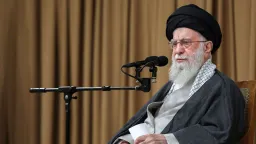The French trade union CGT announced on Thursday that more than one million people participated in protests across the country, while at least 181 protesters have been arrested so far, according to the BFM TV broadcaster.
The Interior Ministry reported that seven law enforcement officers, 10 protesters and a journalist were injured at the rallies.
Ongoing strikes and protests are affecting multiple sectors, including pharmaceuticals and education, as the Federation of Pharmaceutical Unions of France (FSPF) reported 20,000 pharmacists are “in the streets,” while the Student Union syndicate said 110,000 high school and university students have been mobilised.
The Interior Ministry reported that 282,500 demonstrators are marching in regions, excluding Paris.
Officers pelted with stones
After the Paris procession began peacefully, tensions erupted near Boulevard Voltaire, where police reported "an attempt to damage a business." Officers were pelted with stones and bottles in the area, prompting them to fire tear gas grenades and make arrests.
There are reportedly 35,000 departmental gendarmes deployed.
Outgoing Interior Minister Bruno Retailleau told reporters that blockades "were less intense than expected for the first part of the day."
Organised by major French trade unions, the mobilisation came in response to controversial budget proposals introduced by former Prime Minister Francois Bayrou.
More than 80,000 police officers deployed
Retailleau said on Wednesday that he expects a “very, very strong” mobilisation across multiple sectors, including public services, education, transport, agriculture, industry and entertainment.
To secure the protests, the Interior Ministry announced it would deploy more than 80,000 police officers and gendarmes nationwide, alongside armoured vehicles, drones and water cannons.
In a move not seen since the Yellow Vest protests, 24 Centaure armoured vehicles will be deployed across France, along with around 10 water-launching devices.
Approximately 40 union marches are planned across the country, with preliminary estimates indicating that up to 800,000 demonstrators will participate.
Political tensions
The September 18 action follows the “Block Everything” mobilisation last week, which drew nearly 197,000 people nationwide.
France is facing mounting political tensions as Bayrou lost a confidence vote in the National Assembly on September 8.
Bayrou, who unveiled a 2026 budget framework in July, was seeking support for a plan to save nearly €44 billion ($51 billion) as part of efforts to reduce France’s soaring public debt, now at 113% of its GDP.
French President Emmanuel Macron appointed Armed Forces Minister Sebastien Lecornu as the country’s new prime minister. He has been tasked with holding consultations with political parties before forming his government.
Budget deficit
France has one of the EU's largest budget deficits at 5.8% of GDP.
Budget negotiations have been a major source of tension in French politics.
The failure to reach an agreement on the 2025 budget last year also led to the collapse of the Michel Barnier government in December after left-wing and far-right parties united behind a no-confidence motion.




















